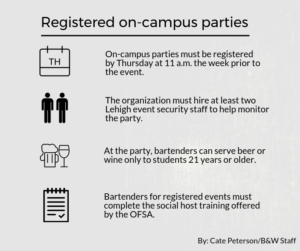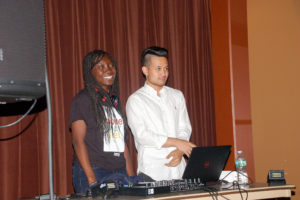This past weekend there were eight registered fraternity parties. In a possible shift in social culture, parties that are often held off campus could be moving back on the Hill.
 The 2017-18 Student Senate survey of Lehigh students found that campus unity was ranked as the third-most prominent issue on campus.
The 2017-18 Student Senate survey of Lehigh students found that campus unity was ranked as the third-most prominent issue on campus.
“We do have some work to be done with regard to our sense of community,” said Ricardo Hall, the vice provost for Student Affairs. “Parties aren’t the end all, but parties are a part of it.”
Registered parties are considered open events and are held in buildings that can accommodate large numbers of students.
Student Senate president Matt Rothberg, ’18, said Senate found the Experimental Party Weekends held last year to be inclusive. These weekends, also called “Epic Party Weekends,” were Fridays and Saturdays when several fraternities hosted open, registered parties on the Hill.
“I think inherent in the nature of the facilities, on-campus events have the opportunity to be much larger and thus can afford to enable more students to attend,” Rothberg said.
Mark Shterk, ’18, the vice president of campus relations for the Interfraternity Council, said if students are turned away from registered parties, it’s because the party is over capacity, which has been a problem at some events.
Shterk said it falls on each fraternity to make inclusion count and the council is pushing the individual organizations to promote inclusivity.
“Definitely, registered parties are promoting unity within the Greek community, hands down,” Shterk said. “Within the school, IFC is starting to try to engage more and more of the different groups and organizations on campus to get more than just people in the Greek community to come out to registered events.”
Senate and the Office of Student Affairs are also working to engage other student organizations by promoting different evening options for students.
Rothberg said registered events do not have to be exclusively hosted by Greek organizations.
“It’s not just a Greek issue,” Rothberg said. “Everyone puts on events, and not everyone has the facilities such as those on the Hill. That’s where Senate comes in: to help the 60 percent non-Greek students to feel like they have a place to socialize on campus.”
Rothberg said Senate-recognized organizations holding events on campus with alcohol is a relatively new initiative. He said Senate is working to compile a list of locations for events and create guidelines on how to host and fund these events. Senate plans to send this information out to organizations this week.
Hall said allowing other organizations to host parties in campus facilities will lighten the burden on fraternities.
“The weight of party planning and hosting shouldn’t fall on the shoulders of a few organizations on campus,” he said.

DJ Zen, ’20, left, and Julius Wibisono, ’20, play a set on Friday, Sept. 29, 2017, in Lamberton Hall. This nighttime event was part of “Late Night Lamberton”. (Cadence Tam/B&W Staff)
Hall sent an email to students Friday about social functions that addressed student concerns about parties on campus and invited students to “Late Night Lamberton.” The Friday evening event in Lamberton Hall offered music by DJ Zen, food and drinks, and lasted from 10 p.m. until 2 a.m.
In the email, Hall acknowledged that some students believe the university is trying to force parties off the Hill.
Hall said he has spoken with President John Simon, Provost Patrick Farrell, trustees and other university leaders about partying and the social scene, and none of them have said that they want students to host social events somewhere other than the Hill.
Hall said he thinks this myth developed because some students disagree with the policies, and they’ve made a leap to believe the university doesn’t want them to party on the Hill.
“And again that’s wrong,” Hall said. “Policies are intended to promote a safe environment, and the main objection students have is that underage students can’t drink alcohol on campus. That’s something that the university, or any university, would never allow.”
Shterk said registered events are safer than off-campus parties because they are held in buildings that can handle high capacities of people and have a bar system in place with just one person serving alcohol.
He said because of these safety benefits, IFC prefers registered events on campus to off-campus events.
Security staff monitor registered events to make sure they are hosted safely. Organizations that host events must hire at least two Lehigh event security staff to help monitor the event. According to the Lehigh University social policy, one security staff member stays at the entrance to the building, and the other is stationed by the bar.
In addition to the hired security staff, the social policy states Lehigh security guards will patrol the campus and perform routine party checks.
Beer or wine is served only to students 21 years or older by a bartender at registered events. Bartenders for registered events must have completed the social host training offered by the Office of Fraternity and Sorority Affairs. Party hosts are responsible for offering non-alcoholic beverages at the event, and the social policy also encourages the organizations to provide food, as well.
According to the policy, parties must be registered by Thursday at 11 a.m. the week prior to the scheduled event by completing a social event registration form in the Office of Fraternity and Sorority Affairs.
While registered parties can promote inclusivity and safety, they do come at an expense for the hosting organization.
Shterk said the cost of registered fraternity parties is a problem the council recognizes and is exploring solutions to. The council wants to find a way to subsidize the cost of registering parties, whether through its own funds or with help from the university.
Rothberg said Senate recognizes that registered events can be incredibly cost prohibitive, but students can use resources like Student Affairs, Student Senate and the Co-Sponsorship Fund to help cover the expenses of these events.
The Co-Sponsorship Fund, maintained by interim dean of students Katherine Lavinder, provides supplemental funding to student clubs and organizations for planned events.
Lehigh police Chief Edward Shupp agrees it’s safer to have parties on campus and wants to see more events shift onto the Hill. When it comes to hosting registered parties, he doesn’t understand why fraternities say money is an issue.
“Students use the excuse, ‘Well we have to hire security, it’s too expensive,'” Shupp said. “I laugh, because I know what the cost is and how much (fraternities) spend at the liquor store and how much they spend at the beer distributors when they buy a pallet of beer or buy five kegs.”
Hall said besides registered parties and events, there are additional opportunities available to students — for example, sports games played in the evenings. He said he hopes students take advantage of school sports events more because athletic event attendance helps build school spirit.
Rothberg said the increase in Greek and non-Greek registered events helps to reorganize how people view Lehigh’s party culture.
“I think having open events on campus is incredibly beneficial to the culture and provides a safe environment for people to socialize with people who they may not have socialized with before,” Rothberg said.






Comment policy
Comments posted to The Brown and White website are reviewed by a moderator before being approved. Incendiary speech or harassing language, including comments targeted at individuals, may be deemed unacceptable and not published. Spam and other soliciting will also be declined.
The Brown and White also reserves the right to not publish entirely anonymous comments.